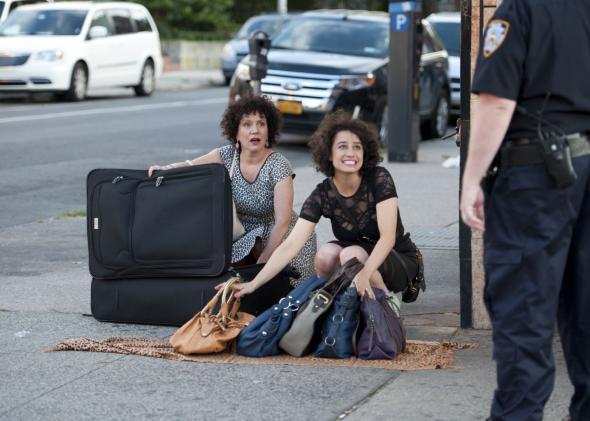The Broad City finale, which aired last night, takes place on St. Marks Place, the stretch of New York’s East Village that is full of restaurants, head shops, and carousers. Like much of New York, it is known as a formerly authentic neighborhood that is now basically a mall. After Ilana and Abbi give a dollar to a homeless person, a guy sitting on a nearby stoop asks them for one, too. They promise to bring him their dinner leftovers, and later, when they don’t, he taunts them: “Must be nice!” You know, that universal three-word conjurer of all condescension and guilt? He says it three times, like a chant, blowing up their spot and the spots of all middle-class people who avoid eye contact with panhandlers. It was treated so lightly that it barely registered as social commentary, but it also reminded me that in some ways, Broad City is just another show that’s stealthily all about class.
The Los Angeles Review of Books recently published a smart conversation between Rebecca Wanzo and Kyla Wazana Tompkins about the show’s sometimes off-putting white middle classness. And the Broad City finale was full of class signifiers—from Ilana gushing over the fanciness of a $12.99 bottle of wine to the fact that the East Village panhandler turned out to be a spoiled rich kid himself. The pleasures of Broad City are so visceral and goofy and fun that it can feel misguided to try to wring too much broader meaning from the show. But in the end, this season’s treatment of class was actually a key part of what made it so good.
The show is very much aware of Abbi and Ilana’s privilege; it uses that old saw of making the characters seem clueless as a way to communicate knowingness to the audience to great comic effect. In the finale, that panhandler is able to guilt-trip them precisely because, “poor” as they may be, they are (unlike, say, the girls of Girls) aware of the air quotes around their disadvantagedness. “Child sex-trafficking is all around us …” Ilana says before trailing off and spotting her next adventure, a wig shop: “Wigs!” It seems just like Ilana to fill in the backstory of an East Village panhandler with a sensationalized, hot-button issue, one that appeals to her interest in sex and all forms of transgression. The girls’ focus, of course, is squarely on having fun and treating New York City as their playground, one in which other people are little more than furniture.
Similar forces were at play earlier this season when Ilana hired a cadre of unpaid interns essentially to do her job for her. She bragged about the diversity of her employees and the opportunity she was providing them, but it took her the entire episode to realize that she was treating them as indentured servants, even using the money they earned her to buy herself a white power suit (which Abbi points out might be easily confused for a white-power suit). Abbi and Ilana’s cluelessness is so ratcheted up, so clumsily apparent, that it’s hard to mistake for cluelessness on the part of the show’s writers.
There’s also the explicit detail in which the show catalogs sums of money: the $903 Abby was offered for the clothes she traded in at Beacon’s Closet in the “Kirk Steele” episode, the $79 replacement dildo at the sex shop, that aforementioned $12.99 wine. The wine price is so specific that it manages to neatly send up Abbi and Ilana’s economic circumstances—the particular luxury of choosing the second-cheapest item instead of the cheapest.
All of these nods to class dynamics make the show better: denser, more meaningful, more interesting to rewatch and notice all the things you missed the first time, more self-aware. Abbi and Ilana’s exaggerated financial lives are of a piece with the rest of their cartoonish lives, like an extra wink at the viewer. In some ways, class discrepancy is the exact comic tension that fuels Broad City: It permits Abbi and Ilana’s airheaded, goofy entitlement to seem that much more ridiculous when juxtaposed against the backdrop of NYC. Even Ilana’s shopping expedition for knockoff bags with her mother is a peek into this crazy underground urban economy, a magical-realist cityscape that somehow contains people as rich as Kelly Ripa, panhandlers who turn out to be grad-school dropouts, actual homeless people, and somewhere-in-between, Abbi and Ilana themselves.
